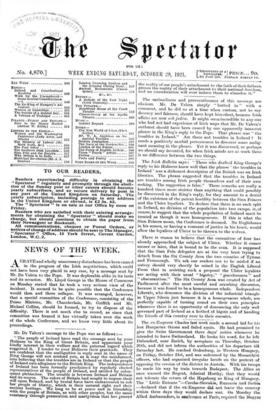The untimeliness and provocativeness of this message are obvious. Mr.
De Valera simply " butted in " with a comment, and he did so at a time when custom, not to say decency and fairness, should have kept him silent, because Irish affairs are now sub judice. It might seem incredible to any ono who had not had experience of Irish ways that Mr. De Valera's outburst should have been caused by one apparently innocent phrase in the King's reply to the Pope. That phrase was " the troubles in Ireland." Are there not troubles in Ireland ? It needs a positively morbid perverseness to discover some malig- nant meaning in the phrase. Yet it was discovered, or perhaps we should say invented, for when Irish minds are at work there is no difference between the two things.






































